Martin Cid's Blog: Martin Cid Magazine, page 1133
April 7, 2012
A Century of Ashes, reviewed by Isabel del Rio
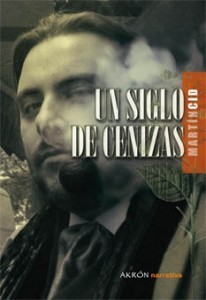
A Century of Ashes, by Martin Cid
What impress me more of A Century of Ashes is the atmosphere. That hell created beside the Mississippi river, in Tennessee, U.S.
The Fiodorovich family fights to survive in a snuff plantation during a century: from the middle of the 19th century, when the first family members start the business, to the middle of the 20th century, when the last members die… consumed by their own irrational sins.
In this novel, Martin Cid creates a collective protagonist and the Mississippi river is its voice and eyes, the blood of this wild family from Russia. They arrive to the United States when there are slaves and they will be unable of adapting to a democratic society.
Bad men, worse women, they increase their tobacco business during the two World Wars…, no feelings, only money, because all is a joke, the joke of those people who are condemned to Hell, the hell that they have created. They like it, because it is better the known world than the future one.
During a century, they have seen great changes and they dislike them: people keep on suffering and they prefer their known sufferings because they know how to prevent them.
All is ashes… all is a joke. The hell is as good as the heavens if you know how to survive among sinners.
Originally posted at http://isabeldelrio.wordpress.com/2011/11/09/review-a-century-of-ashes-by-martin-cid/
Ariza, reviewed by Isadora Sartosa
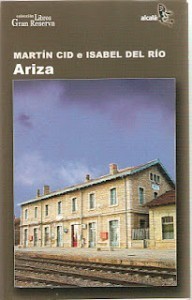
Ariza, by Isabel del Rio y Martin Cid
Recently, I have seen that my beloved novel Ariza is being selling in Amazon:http://www.amazon.co.uk/Ariza-Martin-Cid/dp/8496806529.
Ariza tells the trip of the Medina family through mirrors and shadows of a lost time, still present. A narrative that flies, like the smoke of the locomotive of those old trains that crossed the Spanish Nothern plateau in the 19th century, to descend to the enigmatic nameless city, near our ears and our feelings, home to the Medina's dreams.
PLOT:
Proud wheat fields, white factories and medieval houses greet Miguel Medina. He is hardly a child and he is scared. He gets to the train station hidden in a box of oranges, smelling sour. Eugenio Escudero projects new rail lines, thinking of progress. They meet a moment, outlining silences and blames… In the future, they will meet again and Miguel will marry Lucia, Eugenio's daugther, the silence will grow.
Lucia is the queen in Ariza, a magic farm, always in front of the enigmatic nameless city, unrelated to the wars and problems of the Spain in the next century. His son, Carlos, will look for answers abroad and he will return as a hero without booty, alone, with his music and paintings. But he smiles, slowly, in that Easter of 1930, when the nameless city is singing to the Virgin and waiting for the next train. Maybe this time arrives.
MY OPINION:
Ariza is wonderful. You could consider it an intellectual novel, as it deals with abstract ideas and it has mythological references, but it's not in the least didactic or boring. Sometimes you laugh, sometimes you cry but you never remain indifferent because you identify with the main characters: deep, tender and smart… liars, fighters and losers. I recommend it highly. It's one of those books which can change your life.
Ten Masks of Evil, reviewed by John Glass
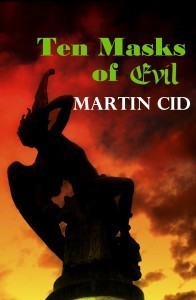
Ten Masks of Evil
Ten Masks of Evil, Martin Cid's last book is classic and experimental. Ten short stories to build a novel or, maybe, a novel born of ten evil minds, including the reader mind (everyone has a dark side).
Martin Cid, author of 'Ariza' (Alcala publishers, 2008), 'A Century of Ashes' (Akron publishers, 2009), 'Eminescu's 7 Sins' (Yareah books, 2010), and 'Propaganda' (Akron, 2011) has been playing with time, an abstract subject that scare everybody since it's beyond rational explanations.
Ten Masks of Evil is past, present and future. Ten Masks of Evil is time because evil (as an opposite of goodness) has been present from the beginning, from that moment when skies fertilized grounds and life started.
The characters change in every short story, they live in different times and places…, all but one: Milton Mills, an enigmatic figure, smart and filthy, always clever to accord and lie with everyone. A game of cards, a game of blood, played for the pleasure of playing but for ambition too.
However, this experimental structure, this new way of describing characters, has a classic background: the Hell of Dante Alighieri, the mythic Faustus or, even, the Holly Books.
Every short story can be catalogued in a different genre:
Chapter 1: 'The Mask of the Player' is Mystery. Five gamblers in Sad Bride, cheating and trying to solve a mystery, which just beginning.
Chapter 2: 'You cannot smoke this Opium without a Mask' is nearly a movie script, film noir, developed between the two World Wars in New York.
Chapter 3: 'The Mask of the Masks: Milton Mills' is classic narrative and a peak, since we will know the origin of M.M., or at least one of his origins, his Russian origin at the end of the 19th century.
Chapter 4: 'A Mask into a Tragedy' is a thriller, with corrupt policemen and bad handsome women, with killers and a murder to solve. Only a murder? Maybe something more. Again in Sad Bride, again in its dreadful legend, around 1960.
Chapter 5: 'A Mask into a Comedy' is funny. They are in Madrid and maybe not living but playing a performance in a theatre.
Chapter 6: 'One Mask, One Drama' is in a plastic time of a pop New York. It could be realistic fiction by his description of that busy society but the mystery keeps on and M.M. guards still the answer.
Chapter 7: 'Same Mask, Two Sisters' is a legend, a beautiful romantic story, dreadful and suggestive at the same time. Old times, legendary women.
Chapter 8: 'The Green Mask'. The legend keeps on near the sea and death, and M.M. reappears in all his glory.
Chapter 9: 'The Mask of Creation'. Written with biblical language, told about different myths, Babylonian or Jews myths, the origins of mankind.
Last Chapter: 'White Masked Nights' is a biography of Edgar Allan Poe, or maybe a biography of Martin Cid or maybe a biography of the reader darkness feelings. A marvelous end.
Definitely, a different book of a different author. Fresh and different, trying to introduce the reader in the narration and trying to entertain him with quick changes of style and atmosphere. Sometimes is humor and sometimes is fear what we feel, but in general mystery and the search of a solution forces us to continue reading, unable to stop this beautiful powerful narration.
More: http://www.martincid.com/?p=207
On Kindle: http://www.amazon.com/dp/B007Q08CZW
A Century of Ashes, reviewed by Rodrigo Martin
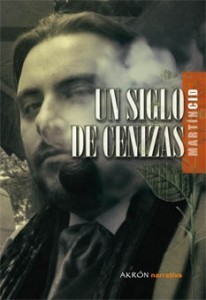
A Century of Ashes
When my teacher of Ethic forced me to make a work about Tobacco and its good and bad effects on people, I was really angry: 'My God!, I thought, another stupid boring work about a stupid boring subject that it is only interesting for politicians looking for votes.'
At home, I told my mother about my worries:
'Oh, she said, I was just now reading a novel about tobacco. It is the story of a family who has a snuff planting in the United States. They obtain a special tobacco, a pipe tobacco very popular before the 1st World War. Afterwards, the new fashion of cigarettes ruins their business. The novel is full of strong jokes and the author tells a complete history of the smoking habit. I think you would like it.'
I started to read the novel and, yes, I enjoyed it. It was hilarious and I liked the main characters. Women were evil and men crazy people fighting for nothing, maybe for the pleasure of being alive (only sex and smoking was ok for them).
I wrote a good work (I think), with a good introduction (3 pages) of the Smoking Habit History, with other 3 pages of its bad effects and other 3 of the smoking pleasures. I concluded that one of the best things that you could do during the 20 century, it was smoking, a quiet habit in a world of wars.
The teacher was disappointed with me. It's a shame.
I am excited about Martin Cid, my new favorite author.
Interview with Ignacio Zara about Ten Masks of Evil
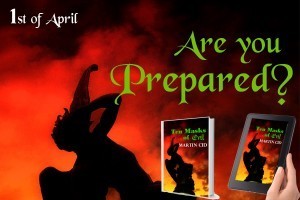
Ten Masks of Evil
(Originally post: Ignacio Zara)
Martin Cid has recently published a mystery book of ten short stories: Ten Masks of Evil, kindle (http://www.amazon.com/Ten-Masks-of-Evil-ebook/dp/B007Q08CZW) and paperback (http://www.amazon.com/Ten-Masks-Evil-Volume-1/dp/1470175967). I have read the book and in spite of the seductive language and attractive descriptions of exotic places (St Petersburg streets, lighthouses in the Northern Sea, or Pop New York flats), it's sometimes frightening, with these immoral characters, outside the love, who hide the most terrible of secrets, always to solve.
However, Martin Cid is not only an author but Yareah magazine editor, a cultural magazine which next month (May 2012), it has already announced: the issue is going to be dedicated to Love.
Q.- Why Love? To compensate Evil?
A.- They are two sides of the same coin. Mankind is fighting for happiness, but we have a dark side which pushes us to destroy our successes, maybe to can get them again. Immobility can be a hell too. Western mentality needs desires.
Q.- What were you looking for with this new book: Ten Masks of Evil?
A.- For readers, I know the most important is the plot. I try to be nice and to offer an engaging storyline, which provokes strong feelings, which involves them among the pages… but to me, as an author, the most important in a new structure, a novel split in ten short stories which compose a whole book.
Q.- Who is Milton Mills (M.M.)?
A.- He is you (laughs) and me, and everyone. He is the main character of Ten Masks of Evil but our dark side two. He hides several secrets: his birth, his capacity of seduction, his objective and his eternity. The reader must discover them, and discover his/her position in front of evil… a delicate question.
Q.- Then, what is your position in front of evil?
A.- (laughs) I have written a book to explain it. You know, it's a book of long gestation. I started to write it more than ten years ago and it has been changing, not the first idea or the structure but the deep personality of the characters.
Q.- There are very many characters. Do you need so many to explain evil?
A.- No, but to explain is power. Every time, every place, every age… is full of evil, it's part of our existence.
Q.- And love?
A.- Love too, as I said you before. However, it's much more engaging evil than love when writing. In novels Love is always No Love… maybe Love at the end; precisely because the novel finishes…, no more to tell. With Yareah magazine is different, a magazine has very many articles, photos, short opinions and no end. Then, you can speak about Love: very necessary too.
Good luck, Martin Cid, with Ten Masks of Evil and with Yareah.
Thanks.
http://www.martincid.com
April 4, 2012
Passport Scotch Whisky
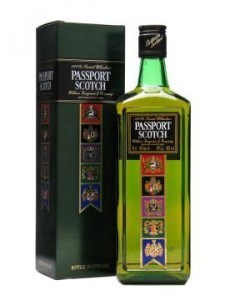
Passport Scotch
Today's whisky is not my favorite one but you can get drunk with it as well as any other: Passport Scotch. In the label its written Blended Scotch Whisky without the 'e'… then we can determine that it's so Scottish as Sean Connery… or maybe a little less, it's impossible to be as Scotish as Sean Connery.
The best:
-You can get drunk.
-Low price. You can read two days with the same cost of one bottle of Jack Daniel's.
-Design. It's a good bottle in fights. Thanks to its rectangular lines, you can walk down from the streets of Dublin with no fear.
The worst:
-No 1 liter bottle option. Maybe we can think that 70cl are very little.
Passport Scotch Whsky

Passport Scotch
Today's whisky is not my favorite one but you can get drunk with it as well as any other: Passport Scotch. In the label its written Blended Scotch Whisky without the 'e'… then we can determine that it's so Scottish as Sean Connery… or maybe a little less, it's impossible to be as Scotish as Sean Connery.
The best:
-You can get drunk.
-Low price. You can read two days with the same cost of one bottle of Jack Daniel's.
-Design. It's a good bottle in fights. Thanks to its rectangular lines, you can walk down from the streets of Dublin with no fear.
The worst:
-No 1 liter bottle option. Maybe we can think that 70cl are very little.
Interview with Joseph Mailander

Cocktail
(Originally posted at Yareah Magazine)
Q: Hello, Joseph. First of all, I would like to congratulate you for your last work The Plasma Terror. When you begin to write it? Why this novel?
Thanks, Martin. Why? Quite frankly, 9/11 was such a traumatic event in American consciousness that I couldn't believe any American novelist would not write a novel about some aspect of the nation's greatest tragedy. Why would you avoid that topic as a novelist? Last year, I saw a novelist call the people who wrote 9/11 novels "ambulance chasers." I felt sorry for such a comment coming from a novelist—I felt like he was guilty of the same kind of thing America's shrinking bourgeois class was guilty of—wishing only to trivialize the catastrophe and carry on with their lives merrily.
You also asked when I began it. Well, the truth is that I began it even before 9/11 happened. That summer, 2001, I had left banking and began to write a satirical novel about reality television—which was new to America, and which I hated. Then 9/11 happened, and it didn't seem possible to be writing anything satirical and flip in the new climate. But about six weeks after 9/11, a friend of mine said, "Why don't you just write 9/11 into it?" He thought it was a perfect fit; he thought the way 9/11 was covered was as a kind of horrific reality show.
I kept working on it for about five years. I basically finished the book in 2005, but re-released it in 2011, near the tenth anniversary of the event. Norman Mailer once said that it takes about 10 years for a nation to digest a catastrophic national event well enough to begin to engage it meaningfully, and I believe that's generally true.
Q: Maybe the reader ignores this point, but you have published several poems in Yareah Magazine about Tarot. I can see some influences of exotic places in your writing, both in your novels and in your poems. I would like to know what's your real intention. I mean, do you think of the potential reader or do you write only for yourself?
Yes, a good question, because the personal experience is such a recognizably postmodern way to create art—but is it too personal? In my Tarot poems, I am trying to do something along the line of what James Joyce did with Dublin in Ulysses or even Dante did with Florence especially in the Inferno. I am taking my own life and experiences and using this as a roadmap for navigating the Tarot. So, I don't think I'm writing anymore for "myself" than Dante or Joyce did. I'm hoping that the result is artful enough that the reader who is completely unacquainted with my own life can still find value in the poems, and perchance even draw from one to navigate a mood or emotion in life—evoked by a particular Tarot card, which are all different evocations of emotions and conditions—in a meaningful way.
Q: I would like to ask you for something: don't kick me to the next question, please (joking, of course). When I read some English or American writers I saw some oversight in the literary form, giving all the importance to the theme and forgetting the beauty of sentences and words. When I read you I don't see it, and I could feel a very better relationship between the theme in the novel and the election of the words… and here is my double question: do you think they are ignoring the literary structure in modern literature? What are your literary intentions?
First, I want a marriage of style and substance—and I am insistent on this to a fetishistic degree. I'll give an example that speaks to your broader question. Though I have presented novels to conventional commercial houses, I never did with my present novel, which is only online. The reason is that I believe it makes the most sense in an electronic format. Mostly this is because of 9/11 itself came to represent as our consciousness of it evolved through the past decade. I believe that 9/11 is probably for Americans the last event that they all experienced collectively through the lens of television. Now, when there are events that demand the attention of all of us, we have other devices contributing to our immediate experience of them.
So, Martin, to me it is not that American writers are deliberately ignoring literary structure, or not employing because of ignorance. It is that they live in a world that gives them a surplus of media applications in which to ply their trade—they are far ahead of (or behind!) continental Europe in the degree to which their lives are organized around media devices. Because of this saturation of textual experience, which comes not only in books and papers but on screens and even on their phones–they rarely worry about how something that genuinely speaks to the world will appear once framed by the archaic form of a nicely printed book. Books, in fact, to some Americans are already beginning to look like what an illuminated manuscript must have looked to people in the early sixteenth century. Yet the writers in these countries still venerate books, and it is in large part a financial equation for them. If we are having problems identifying consistent streams in American literature now, and problems identifying literary forms, it is because writers are too hopeful of the promise of crossing platforms and catching a marketing wave—too rewarded by formlessness—to pay much attention to what form or structure might really mean to-day in literature.
My broader literary intentions are simply to do what writers have done for a long time: to write things that may be transformational for a human soul.
Q: What are your favorite authors and influences?
They ebb and flow with time. I read Proust very early, and he was an early influence, but mostly a sexual one. He was talking about queens, lesbian men, sexual duplicity, and blends of male and female in ways that certainly anticipated the astounding academic work of Judith Butler. From Proust to Lawrence Durrell was a logical step for me: especially in the Alexandria Quartet, a kind of "wine press of love" as Durrell would have it, there were hot adjectives laid next to cold nouns, and that kind of writing blends well with the sexuality of the Quartet (which is not erotic at all, but conversely demonstrates how our sexual moments are alternately sublime and tawdry, and can oscillate rapidly between the two) appeals to me. Also, authors I respect include Gore Vidal and V.S. Pritchett, and finally M.F.K. Fisher; the books of all of these are never very far away from my nightstand. I use the biographies of these authors, especially Durrell's, to help steer my own life.
Q: You worked as a journalist… I don't know if you know it but… well… I must confess I've studied Journalism at the University… What are the differences between the journalism and the literature? Have your books got any influence of the journalism?
There is not much crossover. You are probably aware that Hemingway said that journalism could be good for a writer if he got out of it in time—and that is one of the few true things that Hemingway said. But I will say that I esteem myself more like the grand French feuilleton authors, more like Sartre, say than like any American journalist. I am always, even when publishing in journals, careful to call myself a writer rather than a journalist. That said, I had some journalism experience in college too, including a class from the great Fred Friendly. For journals, I have never written straight news, but always opinion journalism or news analysis or cultural criticism. I am careful not to join organizations—I am nobody's shill or hired gun. As far as influence, the only thing I ever do that marries literature and journalism is to tell people I meet in journalism to read my books!
Q: Another question about journalism. What do you think about New Journalism and Tom Wolfe?
I thought they were a breath of fresh American air. You know, I am old enough that I read them when New Journalism was new. American journalism has always maintained a false front about being "objective"—that is, uncolored by any bias. It was always true that this "objectivity" in American journalism was merely the subjective judgment of fifty-something white American males. New Journalism did away with the rules of objectivity, and something emerged in America that was more along European lines: in Europe, of course, you presume a bias of the periodicals you read even before you read them. This is far more honest. There are still people in America who rant about objectivity but usually these are the most disenfranchised.
I loved The Electric Kool-Aid Acid Test especially. But I also loved Hunter S. Thompson's political book, Fear and Loathing on the Campaign Trail '72, which is one of the best books about a political campaign ever to appear in American politics. That is not to say it is the most accurate. But it is one of the most savage ever writen, and at that point in American history, savagery was the whole point. We need far more books like that, and far fewer academic books on Dwight D. Eisenhower.
Q: Tell me… what do you think it is your best quality as a writer?
My patience. It's amazing, how I haven't killed any editors yet.
Q: How do you build the structure of the novel? Do you have a solid previous plot or do you let your characters grow?
My characters grow to extreme degrees. I don't understand who a character is at the beginning of the novel, only at the end. In one extreme example, I have a particular novel that I was working on for twenty-five years (!). Only in year twenty-four did I finally realize that a certain main character in it was not a man, but a woman. By this point, of course, to change the sex of the character meant changing nearly every sentence, changing what had been done over the previous twenty-four years, changing every pronoun, changing every interaction. But there it was: Jack was actually Lauren. How could I have missed it all those years? Idiot! That plot had been the same since year one—but it was the character I didn't have right, and that was why it took so long to write. It's my favorite work. By the way, and this is really a coincidence, the editor I promised to deliver it to—he had a sex change while I was making my own changes to the character! So there was something very mysterious taking place there. And that's ultimately what I have to say about novels and plotting and characters: we are always really in the presence of mystery when we consider these.
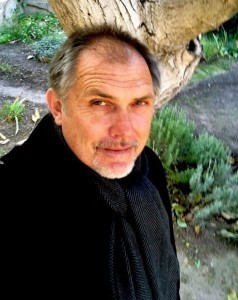 Q: Do you have any projects for the future? What's your next book?
Q: Do you have any projects for the future? What's your next book?My next book is a schizo work par excellence. It is an interanimation of Dante's Divina Commedia involving a protagonist whose mother dies. Two days after her death, he walks on a bridge that is being seismically rehabilitated, and which has holes all through it from the construction work. Each hole is like a bolgia of the Inferno. Then after he crosses this bridge, he will enter a period of purgation that lasts five years, and finally end up in his own paradise, a backyard garden. I should be finished by September, when it will be time to publish another book. But I have two other books completed too, and am also working on yet another. I am always working, as there is always a future.
More in Yareah: http://yareah.com/?p=468
See also: http://street-hassle.blogspot.com.es/
http://laist.com/2006/12/28/joseph_mailander_of_martini_republics_top_10_cocktails_from_2006.php
http://www.facebook.com/jfmailander
Amazon: http://www.amazon.com/The-Plasma-of-Terror-ebook/dp/B005KBQFS0
Balkan Sobraine
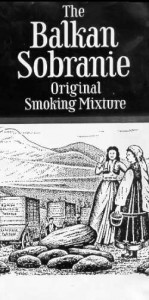
Balkan Sobraine
I'm going to begin this section with one the King of pipe tobbacos, at least for me: Blakan Sobraine.
This is an Engñish pipe tobacco, a mix of orientals and Sirian Latakia. They sold it during years and any macho-pipe-smoker smoked it. I really enjoyed its taste and, overall, I loved the sicken faces of people when I smoked it. Even my father, a great black cigarettes smoker, said that it was such dirt!
None creates this kind of marvelous mix again. The factory now is making cigarettes or some kind of stupid kiddy things. What a stupid word!
.. One moment, please, it would be possible that Balkan is back? We will keep on asking for!
March 30, 2012
Ten Masks of Evil

Ten Masks of Evil
Milton Mills, evil in its purest, is the main character of these ten short stories. He is seductive, mysterious or histrionic actor: it depends on the time, place or sinner who wanted to convince. He is the guide for a trip to our most remote dreams and we will travel from Russia to Spain, from New York to Sad Bride, from the seventies to the first moment of Creation.
Ten Masks of Evil is a volume of short stories created to introduce readers in a new world which is growing as the book progresses. We can read the stories one at a time, but they are complementary and the main characters appear in more than one, under different disguises and situations.
The book is born of a game of cards between the reader and the author, who is asking about the true nature of fiction and reality. Each short story offers a different style: thriller, comedy, romantic tale, historical story or fantasy to complete a literary and experiential way. At he end, in the last story, it is Edgar Allan Poe, in the last moments of his life and the strange circumstances surrounding his death, who will confuse his own biography with those on which he wrote or knew, the same as it has happened to every author and reader, to every policeman or killer, to every person or imagination.
 Buy it:
Buy it:
On Kindle (1$): http://www.amazon.com/dp/B007Q08CZW
Paperback (6$): http://www.amazon.com/Ten-Masks-Evil-Volume-1/dp/1470175967/
Martin Cid Magazine
- Martin Cid's profile
- 6 followers



